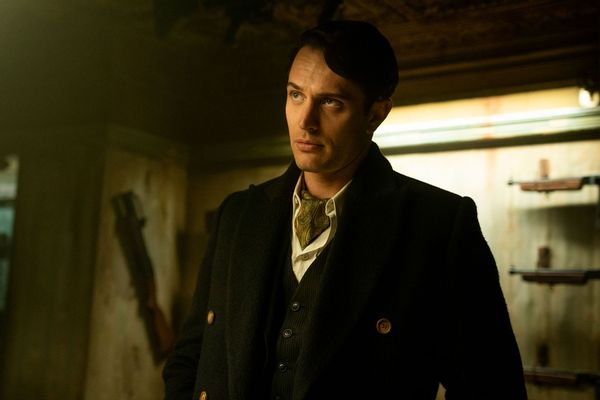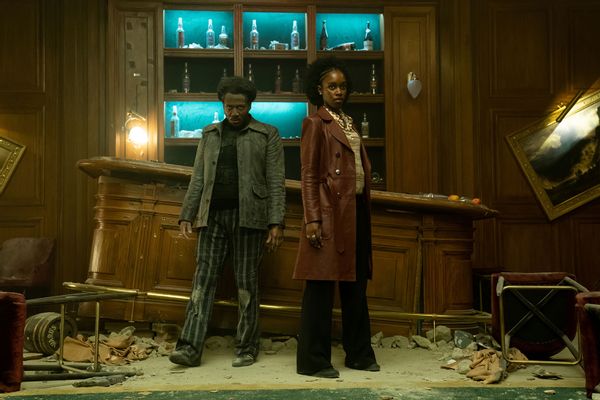
John Wick's legend boils down to simple premise encapsulated in a favorite four-letter acronym: FAFO. For those who require a slightly wordier summary, a low-level thug invades a grieving widower's home and murders his adorable beagle puppy – i.e., the "effing around" part.
Then came the finding out. Said widower is a stone-cold retired hitman, the monster other monsters fear, Baba Yaga. This grievous insult un-retires him. The widower creatively murders his way through dozens of henchmen and ends his assailant's life with a bullet to the head. Shortly afterward he adopts a very sweet pit bull.
That's pretty much all you need to know about John Wick.
"John Wick" was supposed to be a one-off about bloody vengeance designed to showcase combat stunts with the order and efficiency of a first-person shooter. But Keanu Reeves' performance teased audiences into wanting more, yielding three sequels and complexifying the underworld surrounding the title character.
Nevertheless, John Wick doesn't change much between movies. The Continental Hotel is another matter. Elegant, enticingly dark in the middle of the brightest day, the Continental hides secrets and excludes outsiders. To the overall narrative, it is the loom that weaves the "John Wick" universe's fabric, the doorway to a mysterious underworld roamed by assassins and crime bosses and bound by laws designed to maintain civility. It is an institution that serves and can be of service in many imaginative ways . . . in the right hands.
So when I say "The Continental: From the World of John Wick" fails to live up to the most basic possibility this device offers, know that there are many reasons why that have nothing to do with Mel Gibson's top billing.
The three-part spinoff prequel rewinds to the 1970s, a time when New York was a massive hairball, apparently. Its prodigal son Winston Scott (Colin Woodell) abandoned to find his fortune as a London grifter, landing a huge whale in time to be dragged back to America's big rotten apple. His estranged brother Frankie (Ben Robson), a Vietnam vet, stole a coin press from the Continental that is a vital relic to the High Table, the ruling class of this world. (What? Who? Don't worry your pretty head about it.) If Winston can't find Frankie, the people looking for him will find and kill them both.

Escapades with which "The Continental" supplements the character's memoir aren't worth your lost time. What the show does to the legend of the hotel itself is worse, making it a multicar garage for cartoon assassins ripped off from other flicks, including a skeevy brother and sister team named, I wish I were joking, Hansel and Gretel.
Speaking to the manager brings us to the Mel Gibson of it all and, yikes. NBC's announcement of the spinoff may have created cautious excitement, but I'll wager most of that evaporated when his attachment to the project hit the trades. At the time the prevailing question wasn't why but, why not anyone else? What, was Russell Brand unavailable?
Bleak wisecracks aside, having seen everything "The Continental" has to offer I now understand why they tapped Gibson; his villain Cormac is a fume-huffing berserker as sloppy as the den in which he's holed up. He's also not entirely dissimilar from the version of Gibson captured in recorded rants, which comes across as both lazy from an acting perspective and disturbing in its capacity to unnecessarily irritate the audience.
Gibson's incorporation into this universe also defeats whatever chance the show had to replicate some of the movies' success. "John Wick" endures in no small part because of Reeves' popularity and the impression that its soulful hero is an extension of the actor. "The Continental" opens up a corrupt world that is defined by its standards, a notion undercut by having its hotel represented by an objectively awful human of limited acting ability.
Regardless of one's personal feelings about Gibson and the on-the-record accounts of his explosive rage (not to mention his antisemitism, misogyny, and other bigotry) there's little to no defense for his crimes against the Brooklyn accent. One might bristle at Cormac jauntily yelling that he's a "hobo-phone" – never claim the casting producers didn't know what they were doing! – but that line is even worse swathed in an accent cribbed from the linguistic school of "Hey! I'm walkin' heah!"
No "John Wick" stan watches to bask in the dialogue's poetry. However, if you're signing on to take in the balletic violence, I'm sorry to inform you that most of those sequences are unviewable – as in, good luck with seeing them.
Albert Hughes, who directs the first and third episodes, marshals a crisply paced sequence in the first episode but never quite masters the trick of lighting that Chad Stahelski achieves in the films, leaving subsequent face-offs to be swallowed by gloom. Never has a sound editor been more appreciated than here; the slap of skin on skin and chorus of grunting provides some clue of what's transpiring.
A pity, since Winston's backup team of Frankie's friends could have been loads of fun, problematic tropes aside — I mean, it's all relative right? Again, look at who's listed as the star.
Anyway, all of them are top brawlers inspired by '70s exploitation-flick archetypes. There's Miles (Hubert Point-Du Jour) and Lou (Jessica Allain), Black karate experts whose father ran a martial arts studio in the middle of Chinatown. Miles' pal Lemmy (Adam Shapiro) knows his way around bombmaking. Frankie's wife Yen (Nhung Kate) is a killing machine who returned with him from Vietnam. All told, the Asian representation here is . . . really something. Eventually, they enlist a gun played by Ray McKinnon, who is too good for this vestigial limb of a TV disaster, but work is work.

"The Continental: From the World of John Wick" streams on Fridays starting Sept. 22 on Peacock.





